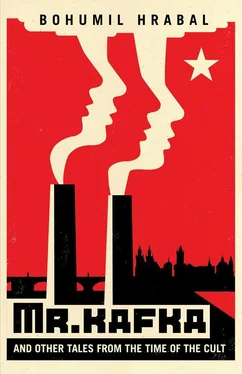Darkness descends rapidly and cyclists wind their way down the serpentine pathways of Petřín Hill with miners’ lamps on their heads. Small boats ply the jade water, with every stroke they lift a dozen aluminum teaspoons from the water. A blind man walks past the row of benches, following the radar sweep of his white cane.
“What do you think about when you draw on the pavement?” I ask.
“The way that bird over there sings,” she says, pointing into the branches. She lowers her chin to her chest. She’s still a child, but in five years, a beautiful parasite will awaken inside her, full of pungent matter with a hint of borax, and gradually flood her life with happiness. I comb her hair, weighing the thick, soft tresses in my hand, then I tie it up with a ribbon. The little girl puts her hand out and very precisely places her finger on the first knot so I can make the second and finish it off with a magnificent bow. Then she turns around, undoes the cord tied around her waist, tightens the two ends of the rope around herself, sticks out her little tummy, and I put my finger on the spot where each end of the cord crosses so she can make a knot and then a bow. And then, in a flash, she kisses the back of my hand and is gone.
From Kampa Park, Charles Bridge looks like a long trough in which pedestrians appear to be gliding along on roller skates. Prague, its broken ribs in the river, moans in pain. The arches of the bridge vault across the water like hounds on the hunt, leaping from one bank to the other. I could visit my cousin in the brewery, or go back to my landlady, who’s invited me to join her for a bottle of blueberry wine, but I’d rather just walk as the spirit moves me.
On Malá Karlová Street a shopkeeper stands in front of his well-lit shop, under a sign with his firm’s name on it: Alfred Wieghold.
“A good evening to you, Mr. Wieghold,” I say, and in my mind, I ask his forgiveness for staring at his prosthetic hands, as chipped as the hands of the Black Madonna of Częstochowa.
“Looks like rain,” I say, and I can’t take my eyes off his artificial arms.
“Young man,” Mr. Wieghold says, “why do you go walking past my shop on your hands? Put them in your pockets. Experience those pockets to the full.”
And he bursts out laughing, this king of marionettes, drumming on his shop window with his artificial limbs, both arms creaking like a weathercock in an autumn wind. Then I walk down Michalská Street, and see a sign that says: “The Iron Door: Strengthens one like fortified wine.”
In the passageway I look into a watchmaker’s shop and see an apprentice sweeping the floor. He keeps blinking, and his eyes are crusted; he must have conjunctivitis, and I’ll bet he has to pry his eyes open every morning to find his way to the washbasin.
Today, I’m encountering walkers in series, as if they were connected by an invisible line: ten people with bandaged heads, a dozen pedestrians with eyebrows meaningfully arched, apparently trying to tell me something, seven people with eye patches…
But it’s the women I notice most. The current fashion is enough to drive you mad. Each one looks as though she’s just arisen from a bed of love. What do they have under those blouses? Some sort of scaffolding, or a structure of whalebone that makes their breasts poke one in the eye? And the way they walk! A man in a big city needs a wardrobe of fantasies not to want to commit a homicidal crime of passion provoked by all that trumped-up beauty. At this point a man falls in beside me and starts telling me about the many strange jobs he’s had: how he worked in Prague’s first automated cafeteria, the Koruna, and how he had to sit concealed inside the contraption and check the one-crown coin people put in the slot, and if it was genuine, he’d put a sandwich on a plate and rotate the mechanism, and he could hear the oohs and ahhs of astonishment at this wonderful invention; or how he had sat inside the huge clock at the exhibition grounds and, with a pocket watch in one hand, he’d push the big hand forward once every minute. As he told me this, he stood there, still transfixed at the wonder of his life.
“Who are you?” I ask.
“A practical philosopher,” he replies.
“Then would you kindly explain Kant’s Critique of Practical Reason to me,” I say.
We walk up Štěpánská Street. Prague, as if on a hydraulic lift, sinks lower, and the practical philosopher’s hair touches the place where stars are born. Then he invites me for a grilled sausage, and on the way, on Rybničká Street, he gives me an explanation. Then he makes the sign of the cross over his fly and slaps himself so hard on the forehead that he sets the streetlamps trembling.
“The old lady over there usually has decent sausages,” I say.
The acetylene lamp casts its light on the old woman, and Rembrandt comes back from the dead. She rests her hands on her stomach as though she were laying them on the Prodigal Son’s back. A single tooth shines in her mouth.
“Gentlemen,” she asks, “is it midnight yet?”
The practical philosopher lifts a finger to the sky, and in that instant he is as beautiful as Rabbi Loew, or as Vincent’s severed ear. The night is full of black slag, silver pinwheels, nuts and bolts. It is redolent of ammonia, sour milk, the intimate toiletry of women, essential oils, lipstick. The clock on Štěpánská Street begins to sound the stroke of midnight; other Prague clocks chime in, then those that are running behind. The practical philosopher eats his grilled sausage with gusto, then walks away without a word of farewell.
A prostitute ambles by, resplendent in a white dress, like an angel; she turns, the pod of her mouth splits open, and two rows of white peas come tumbling out. I long to etch colorful words into her smile, hoping that next morning she’ll read them as she stands before the mirror, her toothbrush in hand.
“Ma’am,” I say to the old sausage seller, “did you ever know a Franz Kafka?”
“Oh my Lord!” she says. “My name is Františka Kafková, and my father, a horsemeat butcher, was František Kafka. Then I knew a headwaiter at the station restaurant in Bydžov who was also called Kafka,” she goes on, leaning closer, her single tooth gleaming in her mouth like a soothsayer’s. “But sir, if you’d like something extra, I can tell you, you’re not going to die a natural death. Have yourself cremated, deed me your ashes and I’ll use you to polish my forks and knives so that something splendid will come of you, like a gift, like misery, like love, hee hee hee…” and she turns her sizzling sausages with a fork.
“I also read cards,” she goes on, “and sir, if you weren’t surrounded by a little cloud, you’d make beautiful things. .. But go on! Get out of here!… Here it is again!” she cries, sweeping something off her skirt and kicking it away with her foot.
“What was that?” I ask.
“Nothing. It’s just Hedvička, the countess’s daughter who drowned. It’s her spirit… d’you see? She’s always with me, and now she’s tugging at my apron. D’you understand?”
“I understand,” I say, backing away from the circle of light cast by the acetylene lamp.
Then I headed home. At the entrance to the Turandot someone is trying to persuade the doorman that he’s got money. At the Šmelhaus, music is coming out of the cellar, along with two old men, laughing. Kožná Street is full of obscene signs and movements. A red rose is lying in the gutter, as though fallen from a bouquet. I sit down beside the fountain in the Old Town Square and my shadow is green and outlined in purple. Someone is carrying a large cactus, each nodule tied with a red ribbon. A lady who looks as if she has stepped out of an Ibsen play is walking along Paris Street, wearing an overcoat over her pyjamas. She clearly can’t sleep and is on her way down to the river to lean on the balustrade and gaze at the water. A man has just propped himself up against a streetlamp, as if listening to serious music; then he vomits and the liquid runs out of his mouth as though he’d dropped a pocket watch on a chain. I see light in my windows, the curtains billowing, my landlady pacing back and forth, crossing herself. No doubt she has her Bible open on the table propped up against a cooking pot. A traffic cop has emerged from Dlouhá Street, looking as though he’d plunged both of his forearms in plaster of Paris.
Читать дальше












